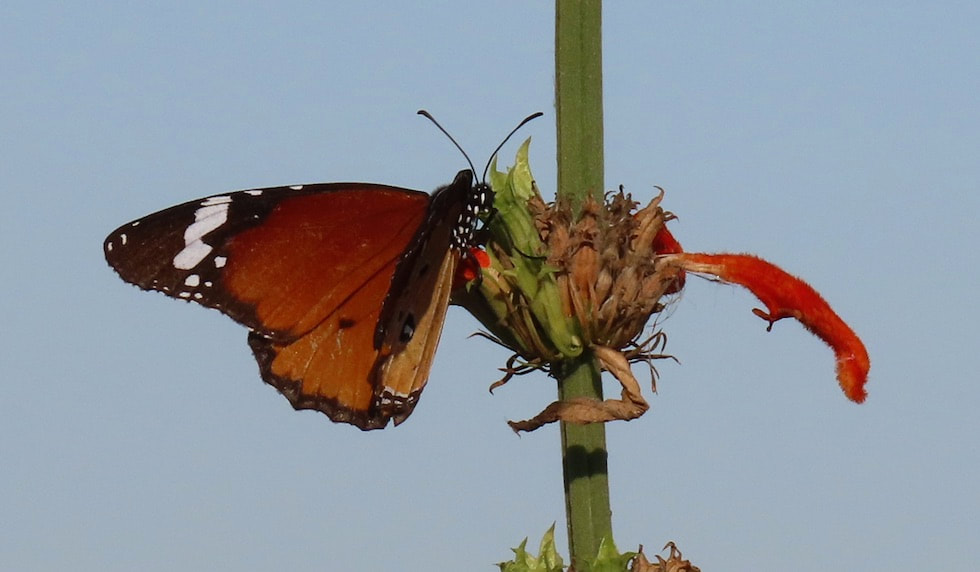|
Winter is planting month in Cape Town. During May and early June, the Forum hosted three planting events with community members and school learners as part of our efforts to restore the indigenous vegetation at Princess Vlei. This is the UN decade of restoration, and here at Princess Vlei we continue to do what we can to conserve biodiversity and restore our beautiful endemic fynbos. In July, we are planning the planting of a new site on the northern shore which will restore Cape Flats Sand Fynbos.
A job for old people? On May 7, seventeen community members came together to plant Protea seeds, Serruria foeniculacea (Rondevlei Spiderhead) and Chrysanthemoides monolifera (bietou) in the restoration plot nearby Briana Cresent. This plot on the northern shore was first planted last year, after the Forum cleared 1500 square metres of alien grasses and weeds. This site offers the opportunity to restore Cape Flats Sand Fynbos, a critically endangered vegetation type only found on the lowlands of Cape Town. These unique habitats have been decimated by the expansion of urban Cape Town, which has left only small islands of Cape Flats Sand Fynbos, most of which is degraded. Restoring this endemic plant community is critical for ensuring the long term survival of many threatened species. This includes Serruria foeniculacea, which was declared extinct in the wild before being rediscovered at Rondevlei in the 1970’s. At the planting, our botanical consultant Alex Lansdowne, explained, 'the work today is ideally suited to old people, as we need to sit and patiently plug holes with hundreds of protea seeds. ‘These protea seeds operate on a principle of survival in numbers. In the fynbos, fire is not just about death. It makes a lot of nutrients available to the soil, animals that die provide food for birds of prey, and it release masses of protea seeds. A lot of mice and other animals eat them, and only about one in twenty are fertile. So we need to lots of holes for lots of seeds.' We had several very young participants, who fortunately seemed just as happy as their parents and grand parents to patiently plug the seeds into the holes! Planting for our future On May 16, fourteen learners from Lotus High came to Princess Vlei on May 16 to help us with restoration planting. The learners were planting in the restoration site that was damaged by the City’s bulldozers in May last year. 'Today we came to Princess Vlei to restore a few of the plants that used to grow here. We are planting grass to stop erosion of the shoreline. Maybe it will look beautiful next time we come,’ said Lotus High learner, Azriedien Gabier. School-mate Diedre Louw, commented, ‘We have come today to restore some plants to Princess Vlei because last year some bulldozers came to destroy our nature. … I like the outdoors and I like greenery so why not come plant something to help the ecosystem? Maybe there are some animals that we didn’t even know about, and by planting something they might come back and we will be able to see them.' Alex Lansdowne told to the learners: ‘The penesetum is a wild relative of the kikuyu that grows in your school lawn. We’ve been growing them hydroponically, which means growing them in water, and feeding them worm tea. Planting them will stabilise the bank. If we don’t, it will continue to erode because of the wave action.’ After they’d finished planting, learners enjoyed skimming stones on the water across the vlei. Nature-loving kids On June 2, 15 different learners came from Lotus High to plant more grass on the eastern shore, and put in 400 seedling of the rain daisy, Dimorphotheca pluvialis. This promises a lovely display in September after the winter rains. Speaking about the benefits of bringing learners to the Vlei, Lotus High science teacher Shafiek Isaacs said: ‘Princess Vlei is on our doorstep, so we can use it to teach kids about nature, and in that way they will teach their kids to take care of any environmental area they have… the work on the vlei is only a start. My learners propagate their own plants… 'This year we have planted 63 trees around the school and in the area, our aim is plant 200 trees. As kids get more involved, their life style chances, their eating habits change… everything is a lesson, I talk about climate change … so the kids eat less meat because of carbon emissions. 'They are more hands on with their school work, because its practical, its not just theory, they’ll learn the names of plants. We must understand where they come from, they come from gang areas. 3 kids were recently shot and killed. They don’t want to be at home, they’d rather stay at school until 6 o’clock They are nature loving kids, they just want to do environmental work. 'It also helps with discipline. The kids are motivated to behave in class so that the can join the outings to Princess vlei.’
0 Comments
Your comment will be posted after it is approved.
Leave a Reply. |
Archives
May 2024
AuthorPosts by Bridget Pitt unless stated otherwise. Categories
All
|
|
Want to Get Involved?
|


 RSS Feed
RSS Feed
